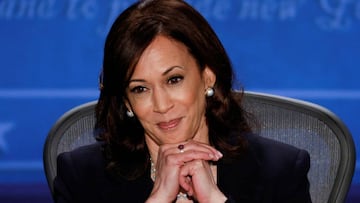Vice presidential debate: what did Kamala Harris say about banning fracking?
In one of the more firey exchanges of the VP debate, Harris said that she and Biden would not ban fracking, despite Pence’s insistence to the contrary.

One of the more heated disputes in the first and only vice presidential debate Wednesday night between California Senator Kamala Harris and incumbent vice president Mike Pence, was over the controversial fossil fuel extraction process; fracking.
Harris repeatedly promised that Joe Biden, if elected president on 3 November would not ban fracking. Pence seemed to think she was lying. So what did Harris say in the debate and is it true? Why is fracking so important?
What happened in the debate?
When the moderator Susan Page turned the topic to the environment, Pence first waxed lyrical about how clean America’s air is, saying that it’s the cleanest air ever recorded. This is not true. The American Lung Association found that the air pollution increase in 2019’s report was worse than the past two reports, which examined air quality dating back to 2013.
The vice president then went on to accuse Harris and Biden of repeatedly saying they wanted to ban fracking.
Harris’ response was clear: "I will repeat, and the American people know, that Joe Biden will not ban fracking. That is a fact," Harris said.
Do Harris and Biden really want to ban fracking?
It’s true that Harris called for a ban on fracking as a presidential candidate, but the Biden climate plan does not take the same stance.
In the past, however, Biden has suggested a commitment to achieve net-zero emissions by 2050, which would presumably imply a significant reduction of fracking. CNN reports that Biden's written plan favours "banning new oil and gas permitting on public lands and waters," not ending all new fracking anywhere or ending all existing fracking on public lands and waters. Biden has explicitly said he does not support a nationwide fracking ban.
Pence went on to argue that Biden would be in favour of implementing the Green New Deal, a progressive plan to tackle climate change. However, Biden said during the first presidential debate last month very clearly that he does not support the Green New Deal.
Emphasising that Joe Biden trusts in science, Harris argued "because you see, Joe understands that the West Coast of our country is burning, including my home state of California…Joe sees what is happening on the Gulf states, which are being battered by storms. Joe has seen and talked with the farmers in Iowa, whose entire crops have been destroyed because of floods, and so Joe believes, again, in science."
Conversely, Pence deflected from the issue, playing down the seriousness of climate change in his answer; "now with regard to climate change, the climate is changing. But the issue is what's the cause? And what do we do about it? And President Trump has made it clear that we are going to continue to listen to the science."
Under Trump’s administration, the US has rolled back several environmental regulations and withdrew from the Paris Climate Accord, which is a global agreement aimed at avoiding dangerous levels of global warming.
The exchange triggered a blunt response from New York congresswoman Alexandria Ocasio-Cortez;
And Trump also had an opinion, naturally.
What is fracking?
Fracking is the process of extracting gas and oil from shale rock. Fracking itself is the process of drilling directly down deep into the earth, before injecting at high pressure a mixture of water, sand and chemicals thousands of feet below the surface. This in turn allows the gas to flow out through the channel. The word fracking describes the way the earth is split or ‘fractured’ apart by the pressure.
Why is fracking controversial?
The benefits of fracking are that it allows companies to generate electricity at half the carbon dioxide emissions of coal. In the US, since fracking was introduced oil production has gone up significantly, and gas prices have gone down.
However, as well as concerns about earth tremors and potentially harmful gases escaping from the earth and potentially contaminating the groundwater near towns and cities, fracking also uses enormous amounts of water, which needs to be transported to the site at significant environmental cost. In addition, it’s estimated that methane emissions from fracking account for one third of all US methane emissions and more than three percent of the total US greenhouse emissions.
Critics also posit that it’s a quick-fix, essentially using up another non-renewable energy source while distracting energy companies from spending time and money exploring greener, more sustainable resources.
Fracking ban threat and the 2020 election
The most important part of fracking controversy during an election year is that in the US fracking is rife, and supports millions of jobs across the country.
So the idea of a fracking ban, or even a partial ban in a swing state like Pennsylvania (which Trump won in 2016 by less than 1 percent) where hundreds of thousands of jobs rely on fracking , threatens a significant proportion of the electorate’s livelihoods.
Figures from 2016 showed that fracking was active in 34 states. As of 2019, Vermont, Washington, Maryland and New York had passed fracking bans.
For more on the US Election 2020 follow our coverage.






